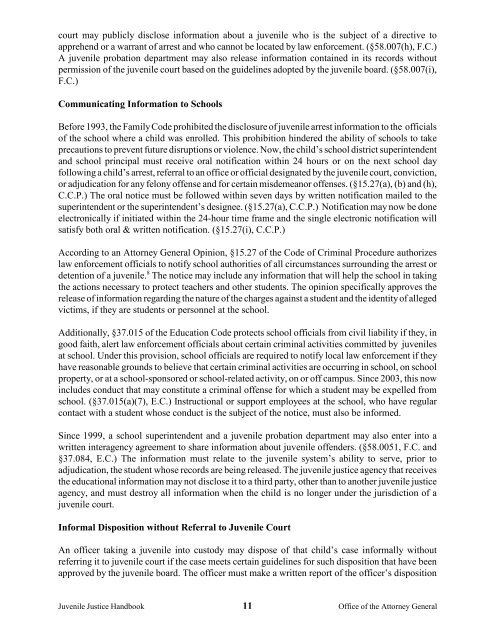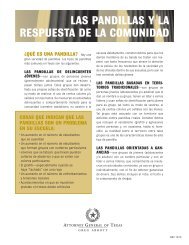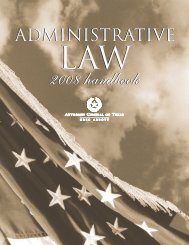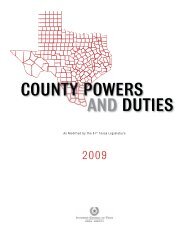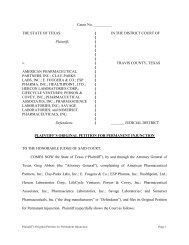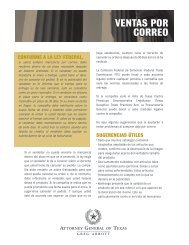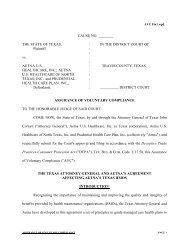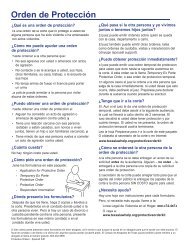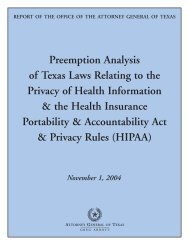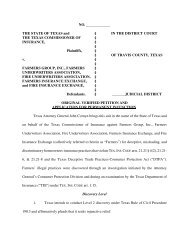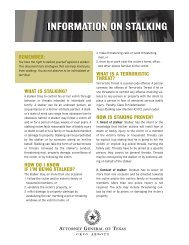Juvenile Justice Handbook - Texas Attorney General
Juvenile Justice Handbook - Texas Attorney General
Juvenile Justice Handbook - Texas Attorney General
You also want an ePaper? Increase the reach of your titles
YUMPU automatically turns print PDFs into web optimized ePapers that Google loves.
court may publicly disclose information about a juvenile who is the subject of a directive to<br />
apprehend or a warrant of arrest and who cannot be located by law enforcement. (§58.007(h), F.C.)<br />
A juvenile probation department may also release information contained in its records without<br />
permission of the juvenile court based on the guidelines adopted by the juvenile board. (§58.007(i),<br />
F.C.)<br />
Communicating Information to Schools<br />
Before 1993, the Family Code prohibited the disclosure of juvenile arrest information to the officials<br />
of the school where a child was enrolled. This prohibition hindered the ability of schools to take<br />
precautions to prevent future disruptions or violence. Now, the child’s school district superintendent<br />
and school principal must receive oral notification within 24 hours or on the next school day<br />
following a child’s arrest, referral to an office or official designated by the juvenile court, conviction,<br />
or adjudication for any felony offense and for certain misdemeanor offenses. (§15.27(a), (b) and (h),<br />
C.C.P.) The oral notice must be followed within seven days by written notification mailed to the<br />
superintendent or the superintendent’s designee. (§15.27(a), C.C.P.) Notification may now be done<br />
electronically if initiated within the 24-hour time frame and the single electronic notification will<br />
satisfy both oral & written notification. (§15.27(i), C.C.P.)<br />
According to an <strong>Attorney</strong> <strong>General</strong> Opinion, §15.27 of the Code of Criminal Procedure authorizes<br />
law enforcement officials to notify school authorities of all circumstances surrounding the arrest or<br />
detention of a juvenile. 8 The notice may include any information that will help the school in taking<br />
the actions necessary to protect teachers and other students. The opinion specifically approves the<br />
release of information regarding the nature of the charges against a student and the identity of alleged<br />
victims, if they are students or personnel at the school.<br />
Additionally, §37.015 of the Education Code protects school officials from civil liability if they, in<br />
good faith, alert law enforcement officials about certain criminal activities committed by juveniles<br />
at school. Under this provision, school officials are required to notify local law enforcement if they<br />
have reasonable grounds to believe that certain criminal activities are occurring in school, on school<br />
property, or at a school-sponsored or school-related activity, on or off campus. Since 2003, this now<br />
includes conduct that may constitute a criminal offense for which a student may be expelled from<br />
school. (§37.015(a)(7), E.C.) Instructional or support employees at the school, who have regular<br />
contact with a student whose conduct is the subject of the notice, must also be informed.<br />
Since 1999, a school superintendent and a juvenile probation department may also enter into a<br />
written interagency agreement to share information about juvenile offenders. (§58.0051, F.C. and<br />
§37.084, E.C.) The information must relate to the juvenile system’s ability to serve, prior to<br />
adjudication, the student whose records are being released. The juvenile justice agency that receives<br />
the educational information may not disclose it to a third party, other than to another juvenile justice<br />
agency, and must destroy all information when the child is no longer under the jurisdiction of a<br />
juvenile court.<br />
Informal Disposition without Referral to <strong>Juvenile</strong> Court<br />
An officer taking a juvenile into custody may dispose of that child’s case informally without<br />
referring it to juvenile court if the case meets certain guidelines for such disposition that have been<br />
approved by the juvenile board. The officer must make a written report of the officer’s disposition<br />
<strong>Juvenile</strong> <strong>Justice</strong> <strong>Handbook</strong> 11<br />
Office of the <strong>Attorney</strong> <strong>General</strong>


